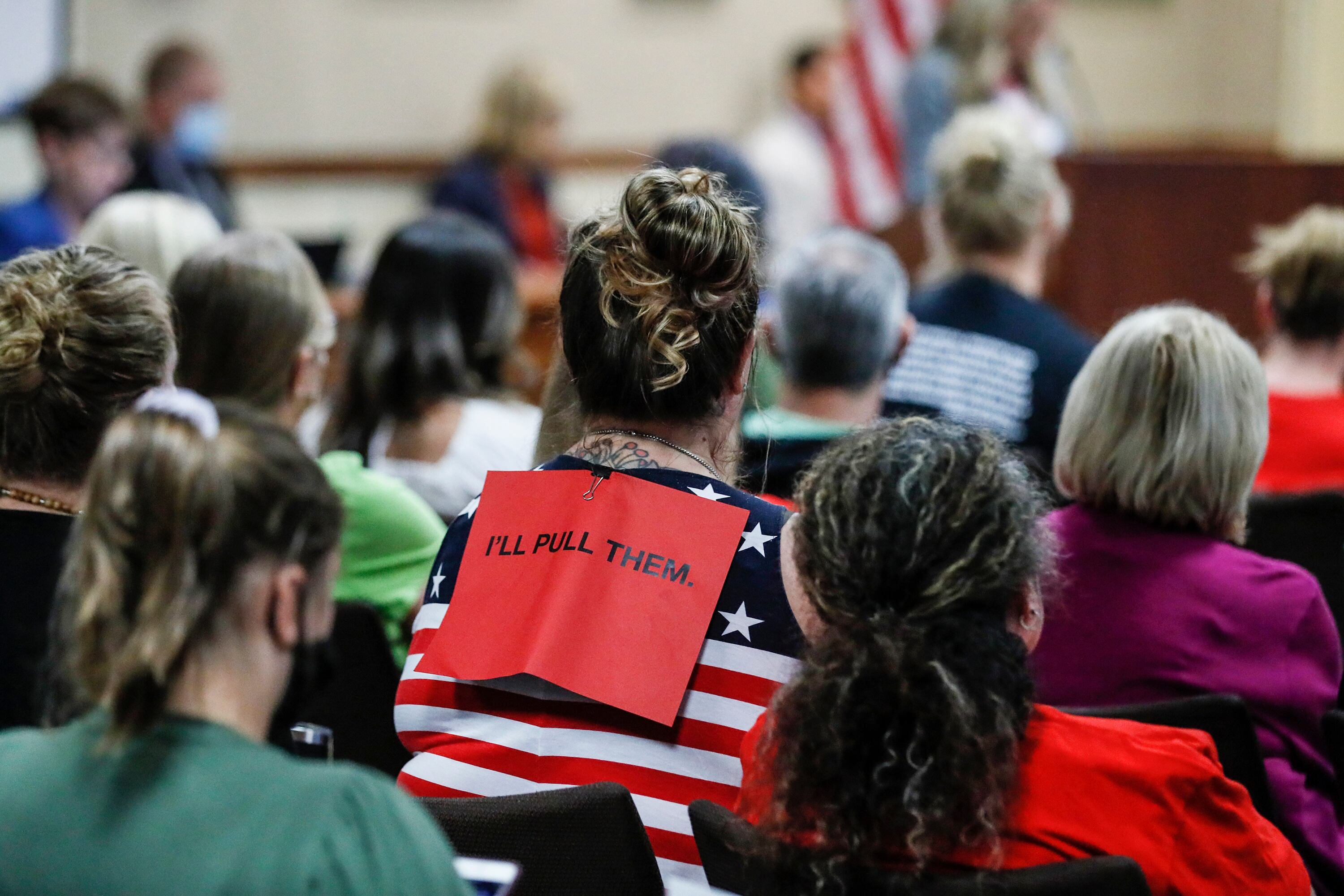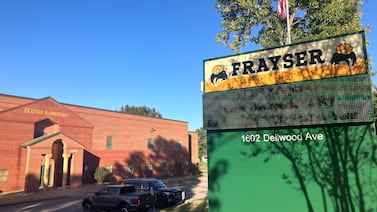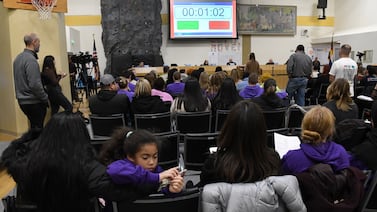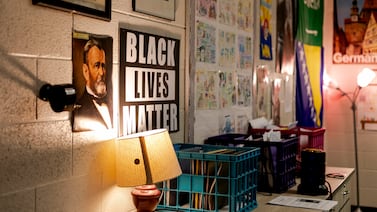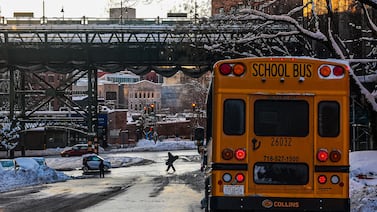Once a bastion of bipartisanship, education policy now divides most Americans along party lines.
Democrats and Republicans are diverging on issues, such as school choice, where they once shared common ground. And new debates over school COVID policies and curriculum have driven the parties even further apart.
What explains the widening rifts over education? A new study indicates that it’s largely due to political sorting, or individuals bringing their views in line with their parties’.
“Folks are switching their issue positions to align with their party affiliation,” said David Houston, an education policy professor at George Mason University who authored the new working paper. He added that some issues have also seen polarization, or party members embracing more extreme positions.
For example, individual Democrats who once supported charter schools have turned away from them, while Republicans increasingly oppose teachers unions. On that issue, the partisan gap has grown by an average of 1.4 percentage points per year, culminating in a 40-point divide in union support by 2022.
The polarization and sorting have put the country “potentially on the cusp of a new era in education politics,” Houston writes in the paper, which has not yet been peer reviewed. This divided era in education will be defined by Congressional gridlock, partisan animosity, and stark differences in schooling based on whether a child’s state is red or blue.
“I certainly think these developments are negative,” Houston said. “These all sound like pretty terrible things.”
Released in December, the new working paper looks at changes in public attitudes toward education from 2007 to 2022 as measured by an annual poll commissioned by Education Next, a publication focused on K-12 schools.
Analyzing the nationally representative survey results, Houston found that Democrats and Republicans have drifted apart on a range of issues, including teachers unions, teacher pay, and charter schools.
The growing partisan divide can’t be fully explained by changing party demographics, Houston determined. And while views on some issues grew more polarized, with party members expressing stronger opposition or support over time, that also wasn’t the main driver. Instead, political sorting outpaced polarization on most issues.
Take the topic of school quality. People from both parties once gave the nation’s public schools very similar grades, but over time those ratings have started to diverge.
Houston calculated that polarization — in this case, individuals shifting to either end of the A-F grading scale — grew by 27% during the study period. However, political sorting — or most Democrats giving schools relatively high marks and most Republicans grading schools more harshly — soared by more than 160% for both parties.
Such sorting rarely stems from people switching parties, Houston found. Rather, people were much more likely to change their views on a given issue to conform with their party.
Republicans “are learning how to think about education like a Republican,” said Jeffrey Henig, a political scientist at Teachers College, Columbia University, while Democrats are “learning how to think about education like a Democrat.”
Historically, education has been far less partisan than other policy issues. Over the past two decades, major federal education laws passed with broad bipartisan support, and red and blue states adopted similar teacher rating systems and learning standards. At the local level, school board races typically are nonpartisan and voting occurs separately from other elections.
But that partisan insulation has been slowly eroding. Mayors, governors, and philanthropic groups have challenged the authority of local school boards and local teachers unions, sparking new political clashes and bringing national education debates to the local level.
“When people were making decisions based on their local community and their local experience, Republicans and Democrats didn’t differ sharply,” Henig said. But “when the debates get nationalized, either because they’re getting driven by national legislation or national interest groups are reaching into these communities, then you do get this sharp partisan divide.”
Meanwhile, the national political parties have become increasingly polarized, leaving little middle ground. After Republican leaders and activists rejected the Common Core learning standards and Democratic elites distanced themselves from charter schools, for example, individual party members followed suit.
“Members of the public kind of learn issue positions via politicians and the media,” said Sarah Reckhow, a political scientist at Michigan State University, who co-authored a book with Henig. And because party affiliation has become central to many people’s personal identity, most will “change their issue positions to align with their party rather than the reverse.”
Not every education issue has become more partisan. For example, the two parties have actually converged over time on standardized testing, with more than 70% of Republicans and Democrats now expressing support for yearly exams, according to Education Next’s 2022 survey. And some local matters, such as school construction, can defy politicization.
But consensus issues have been overshadowed by new hyper-partisan debates over school COVID responses, LGBTQ students’ rights, and teaching about racism.
Those issues split the public into opposing camps. For example, 65% of Democrats supported school mask mandates while 63% of Republicans opposed them, according to the 2022 poll. And about half of Republicans said schools focus too much on race, while a similar share of Democrats thought the opposite.
In last year’s midterm races, some hard-right candidates sought to exploit those divisions by insisting that schools are exposing children to critical race theory and sexually explicit books. Even though that strategy fell short in several high-profile races, the parties’ starkly different education agendas — with Republicans focused on cultural issues and parents’ rights, and Democrats more concerned with school funding and protecting vulnerable students — still highlighted their ideological estrangement.
“So not only has education become a major political battleground,” said Jonathan E. Collins, a political scientist at Brown University, but “the polarized electorate has taken on radically different ideas of what we should value when it comes to education.”
What will this education disunity mean for America? The likely future is already here.
Conservative activists have demanded that schools remove books they oppose, parents have sued to block school mask mandates, and Republican state lawmakers have restricted what teachers can share about race, gender, and American history.
“It’s higher-pitched battles between your more purified armies,” Henig said, “where everything seems like it’s zero-sum, winner-take-all.”
These clashes are largely playing out in the states, the majority of which have elected governors and legislatures from the same party. One-party control allows states to avoid the partisan stalemate that has paralyzed Congress, but it also opens the door to more extreme policies and disincentivizes compromise.
“As we see fewer ‘purple’ states, we’ll likely see policy reforms in red states and blue states that spiral deeper and deeper into whatever ideological commitments the party in power holds,” Collins wrote in an email.
In practice, that means students in Iowa could study a different history of slavery in the U.S. than their peers in Illinois, while a transgender girl could join her school’s field hockey team in California but not in Kentucky.
“We’re going to look up,” Collins said, “and it’ll be night and day.”
Patrick Wall is a senior reporter covering national education issues. Contact him at pwall@chalkbeat.org.

